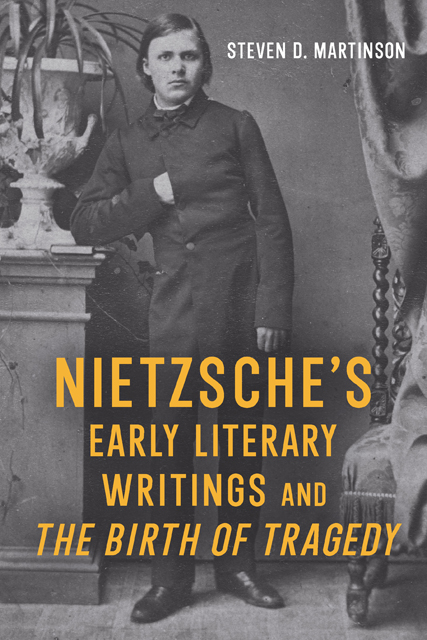Conclusion
Published online by Cambridge University Press: 17 December 2022
Summary
Nietzsche's writings constitute a wide field of signification. Nietzsche the creative writer explores possibilities and experiments with a myriad of topics and forms, forming and re-forming ideas. Even as a philosopher, Nietzsche remains elusive and for the very reason that he was also a creative artist.
As its title indicates, Nietzsche wrote The Birth of Tragedy “out of the spirit of music.” He cites Friedrich Schiller's remarkable insight that, in the experience of a poet, a musical mood comes first and then the poetic idea: poetry emerges out of music. As we have seen, Nietzsche had arrived at a similar realization early in his writing career, at the age of fourteen. Given our knowledge of the privileged role Nietzsche assigned to music, it is not surprising that he composed a more extensive musical piece of his “Eine Sylvesternacht” (A New Year's Eve, 1864) while writing The Birth of Tragedy, titled simply “Sylvesternacht” (New Year's Eve, November 1871). In his “Entwürfe zur Sylvesternacht” (Drafts for New Year's Eve) of 1863, Nietzsche had written that whenever he played it, the composition drew everything together, forming a very pleasant mood. But music does not simply move a person spiritually; it effects the body as well. For these reasons, and because of its universality, music was the greatest motivating force of creation for Nietzsche.
Music also drives the formation of poetic images. The concept of Einbildungskraft, the power of imagination, became an operating principle for the creation of literary works of art during the Sturm und Drang (Storm and Stress, later eighteenth century) and Romantic (early nineteenth century) movements. Nietzsche's own imagination is everywhere apparent in The Birth of Tragedy, especially in his depictions of the emergence of tragedy out of the depths of (Dionysian) existence and the (Apollonian) saving nature of the beautiful illusion of art.
Nietzsche also wrote The Birth of Tragedy out of the spirit of his early literary writings. Near its end, he introduced the legend of the reincarnation of Emperor Barbarossa and the image of a German knight slaying a dragon. In a way, he had come full circle. As a boy, he had shuddered at the image of St. George, the martyr and slayer of dragons, on the wall relief in his father's church in Röcken.
- Type
- Chapter
- Information
- Nietzsche’s Early Literary Writings and The Birth of Tragedy , pp. 250 - 252Publisher: Boydell & BrewerPrint publication year: 2022



